How Myanmar’s junta used a coup to settle old scores
12 September 2021
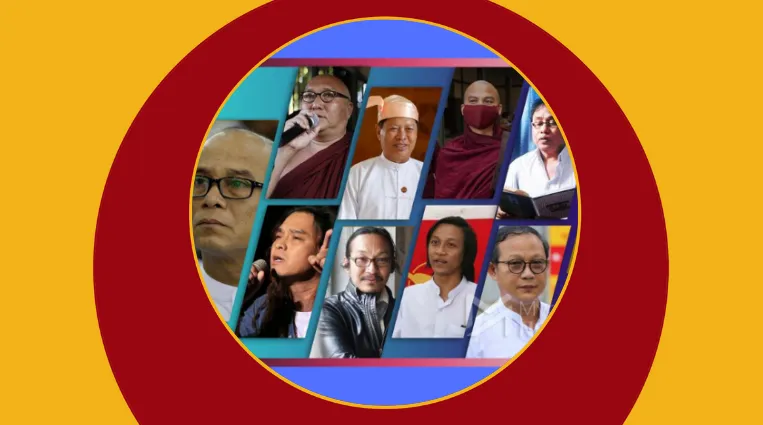

Many of those imprisoned on the day of the military takeover had long been in the generals’ sights for questioning their right to rule
Many of those imprisoned on the day of the military takeover had long been in the generals’ sights for questioning their right to rule
By Myanmar Now
On February 1, the people of Myanmar woke up to their worst nightmare: the return of military rule after nearly a decade of relative freedom. The predawn arrest of State Counsellor Aung San Suu Kyi and President Win Myint signalled the end of a brief era of elected government and set the stage for the massive demonstrations and brutal crackdowns that were to follow.
But the country’s civilian leaders were not the only ones detained that day. Many others were also taken into custody, not because they presented any immediate threat to the coup makers, but because they had displeased them in the past.
Senior General Min Aung Hlaing, who orchestrated the military’s return to direct control over the state, moved swiftly to punish perceived enemies, locking them up even before they could utter a word of protest. Besides activists and politicians, his targets included celebrities, monks and other public figures who dared to question the army’s right to rule.
Some had already been marked for revenge before the coup. Charged with offenses related to their criticism of the military or its bigoted henchmen, they were among the first to be silenced when the time came to start settling scores.
Others, however, were arrested without even a pretence of legal justification. As with the allegations of voter fraud that served as the pretext for the military takeover, no serious evidence of wrongdoing was ever presented against them.
In every case, all that mattered was the alleged offenders’ attitude towards the class of men who consider themselves Myanmar’s natural rulers.
The profiles that follow provide a glimpse into the thinking of the generals and what they fear most—the prospect of losing power to those who refuse to fear them.
Mya Aye
Mya Aye, a veteran activist who played a leading role in the 1988 pro-democracy uprising, was taken away from his home on the morning of the coup and held incommunicado for the next two months. It was not until April 1 that his family learned that he was being held in Yangon’s notorious Insein Prison.
Their relief at finally finding out where he was soon turned to dismay, however, when they discovered that Mya Aye had been charged with hate speech under section 505c of the Penal Code, which deals with acts likely to incite a criminal offence against any group or individual based on their ethnic or religious background.
What made this so bewildering was the fact that, as a prominent Muslim political leader, Mya Aye had long been involved in interfaith efforts to end tensions between the country’s various religious communities.
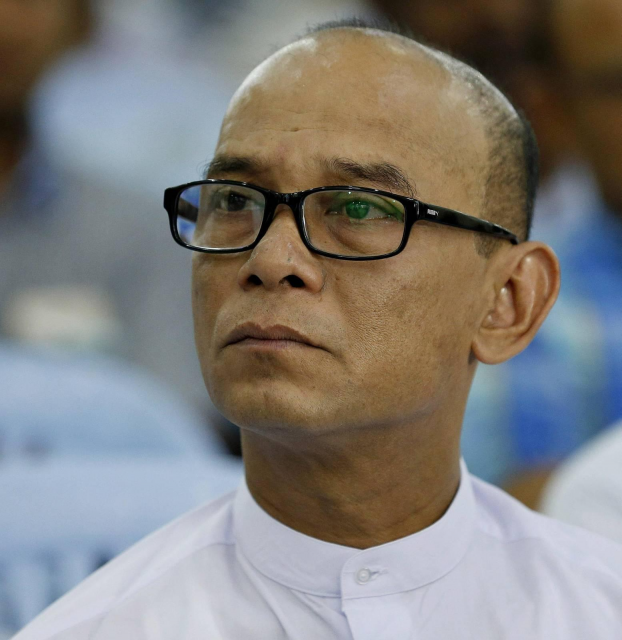
Veteran activist Mya Aye, an advocate of interfaith dialogue, faces hate speech charges over an email he sent in 2014 (EPA)
The charges, which carry a possible sentence of two years in prison, stem from an email he sent from his mobile phone in November 2014. At the time, he was working with the ethnic affairs department of the 88 Generation Peace and Open Society, led by former student leader Min Ko Naing.
The email, which was related to Myanmar’s peace process, touched on the subjects of Burman ethno-nationalism and the need for cooperation among the country’s ethnic groups in order to achieve true federalism.
“The only reason he sent that email was for the country’s sake. No conflicts between ethnicities, races or countries resulted from that email sent in 2014,” said his lawyer, Thet Naung.
Mya Aye had been on the army’s radar since 1988, when he was a teacher who founded his own party to coordinate the efforts of younger leaders.
“We were student leaders and he was the party chair. We usually held our meetings at his party’s office, which was essentially a rebel’s hideout,” recalled former political prisoner Tun Kyi.
“The only reason he sent that email was for the country’s sake. No conflicts between ethnicities, races or countries resulted from that email sent in 2014 – Mya Aye’s lawyer”
Mya Aye was imprisoned twice, in 1989 and 2007, and spent a total of 12 years behind bars. During his years of freedom, he remained politically active and often courted the military’s ire.
When the generals hinted before the coup that they might seize power again, Mya Aye described their words as an act of intimidation. He also rightly foretold the disastrous consequences of such a move.
“A coup would be really bad for the country. We’ll be looked down upon by the international community. It’s a losing battle for everyone, including the military itself, the people, the winning party of the election, everyone, really,” he said.
For those familiar with his career of speaking truth to power, Mya Aye’s arrest came as no surprise.
“They know exactly who their enemies are,” Tun Kyi said of the country’s dictators. “They regard every activist and politician who stands against them as their enemy. And they have a very strong grudge against them.”
Thura Aung Ko
Thura Aung Ko’s journey from high office to a prison cell was a long and unlikely one. But a full year before his arrest, it was clear that the former army general and government minister was a marked man.
In February 2020, after he suggested that the only reason the fugitive monk Wirathu remained at large was because the police answer to the military-controlled Ministry of Home Affairs, and not to the civilian government, army spokesperson Brig-Gen Zaw Min Tun called on the then-ruling NLD administration to “take action” against him for defamation.
But it was long before this episode that Aung Ko, a retired brigadier general who once served as deputy minister for religious affairs under the former junta, began his fall from favour with the military’s senior leaders.
When Myanmar made a transition to quasi-civilian rule under retired general Thein Sein in 2011, Aung Ko was one of the key holdovers from the military regime that held power until then.
As a prominent member of the military-backed USDP, he was elected to the Pyithu Hluttaw, or lower house of parliament, in 2010 and appointed chair of a judicial and legislative review committee. In this capacity, he advocated for the suspension of a clause in the constitution that barred then opposition leader Aung San Suu Kyi from becoming president, signalling a break with the military’s entrenched position on the matter.
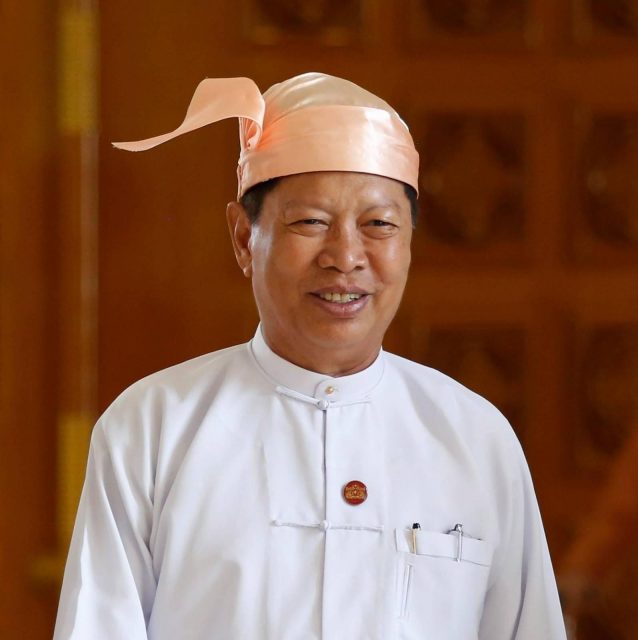
As minister of religion, Thura Aung Ko played a key role in disbanding the notorious ultranationalist group Ma Ba Tha (EPA)
In August 2015, when Thura Shwe Mann, the speaker of the Union parliament, was removed as chair of the USDP by a faction that felt he had grown too close to Suu Kyi, Aung Ko also found himself on chilly terms with the party. The two former generals, who share the “thura” title signifying courage in battle, were seen as allies who threatened to weaken the army’s hold over Myanmar politics.
When the NLD came to power after a landslide win in the 2015 election, Aung Ko was named minister of religion and culture despite losing his seat in parliament. As head of the ministry, he was instrumental in shutting down the ultranationalist group Ma Ba Tha, led by firebrand monk Wirathu, in July 2017.
Although Wirathu remained active after this, he was eventually prosecuted for sedition. After more than a year on the run, he turned himself in to the police just days before the 2020 election. (Imprisoned under the NLD government, he was pardoned and released by the junta earlier this month.)
On March 5, more than a month after his arrest on the day of the coup, Aung Ko was charged with corruption for allegedly awarding religious titles to individuals in exchange for bribes.
Currently being held in Insein Prison, the 74-year-old ex-general who made the mistake of displeasing higher-ranked hardliners now faces a sentence of 15 years behind bars.
Min Htin Ko Ko Gyi
Documentary filmmaker Min Htin Ko Ko Gyi is well-acquainted with the generals’ vindictiveness. Less than a year before his latest arrest, he was released from prison after serving a one-year sentence for writing Facebook posts critical of the military-drafted 2008 constitution and the army’s role in politics.
Accused of making derogatory remarks that harmed the dignity of the military, Min Htin Ko Ko Gyi was charged in April 2019 with incitement under section 505a of the Penal Code. He was freed in February 2020 after receiving routine sentence reductions, but was repeatedly denied bail during his incarceration, despite suffering from liver cancer.
A long-time critic of the military-backed Union Solidarity and Development Party (USDP) and Ma Ba Tha, the Buddhist nationalist organization that actively promoted anti-Muslim sentiment, Min Htin Ko Ko Gyi was “a thorn in the soles of the feet of the fascist generals,” as one colleague put it.
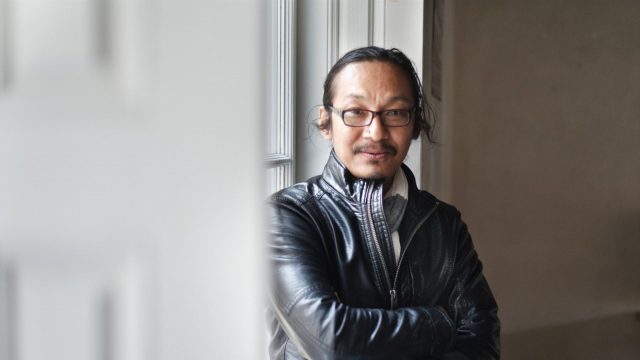
Documentary filmmaker Min Htin Ko Ko Gyi was a frequent target of censorship under the previous regime (Myo Myint Swe)
Part of the reason for this is that he had long been a supporter of the National League for Democracy (NLD) and its leader, Aung San Suu Kyi. One way he demonstrated this was by auctioning off a poem written by Suu Kyi for 240m kyat (nearly $145,000) and donating the proceeds to her party.
Despite being a well-respected filmmaker with an international reputation, Min Htin Ko Ko Gyi was unable to screen any of his early work in Myanmar because it was banned by the junta that ruled the country until 2011.
“a thorn in the soles of the feet of the fascist generals”
His 2010 documentary “The Floating Tomatoes”—about the environmental degradation of Inle Lake in Shan State—and his first film, “Human Zoo,” which examines the exploitation of the so-called “long-neck” Padaung people in Thailand, were well-received overseas, but couldn’t be seen at home due to the regime’s censorship.
When Myanmar began a partial opening a decade ago, Min Htin Ko Ko Gyi started organizing events to bring his own work and that of others to a Myanmar audience. For the first, the Art of Freedom Film Festival, he collaborated with Zarganar, a comedian and fellow director who was also known as a vocal opponent of military rule.
This was followed by the Human Rights Human Dignity International Film Festival and the founding of the Human Dignity Institute, which produces documentaries and short films on human rights.
“his ideals as an artist and the passion and inspiration he has fostered in young filmmakers cannot be contained and will not be silenced – Min Htin Ko Ko Gyi’s colleague”
According to his colleague, who asked to remain anonymous, many young filmmakers owe their start to Min Htin Ko Ko Gyi. Through them and through his own films, he continues to influence public discourse in Myanmar, even as he remains a prisoner of the junta.
“The fascist regime may have succeeded [in detaining] Min Htin Ko Ko Gyi, but his ideals as an artist and the passion and inspiration he has fostered in young filmmakers cannot be contained and will not be silenced,” said the colleague.
Min Htin Ko Ko Gyi, 59, and his former collaborator Zarganar, 60, are both currently being held in Insein Prison, along with many others deemed a threat to the regime.
Htin Lin Oo
As he awaited his arrest on the morning of February 1, author and former NLD information officer Htin Lin Oo recorded a nine-minute live broadcast on social media to denounce the military’s actions. No matter what, he said, he would always oppose the dictatorship.
“I am not opposing the army. I am opposing the dictators who staged the coup. All of us civilians have to rise up and revolt against the dictatorship,” he said in his final public statement before being taken away.
Htin Lin Oo accused the generals of killing democracy in its infancy. Every time they staged a coup, he said, they threw the country decades behind the rest of the world, as they did when they seized power in 1962 and 1988.
Not surprisingly, these remarks did not sit well with Myanmar’s newly self-appointed leaders. After arresting him without charges, they hastened to use his online comments to charge him with incitement and spreading false news on social media.
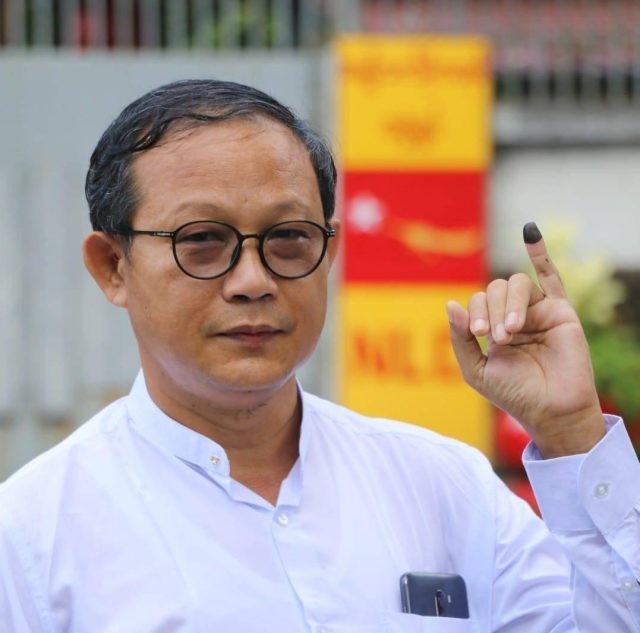
Htin Lin Oo previously served two years with hard labour for accusing the military of using religion to sow division (Htin Lin Oo/ Facebook)
As was the case with many others arrested that day, Htin Lin Oo had a history of displeasing the military. In a speech delivered in Magway Region’s Chaung Oo Township in October 2014, he accused the army of using religion to create conflict and maintain control.
A 10-minute excerpt from his two-hour speech was circulated widely online and portrayed as an attack on Buddhism, the religion of the majority in Myanmar. It proved so controversial that even his own party distanced itself from his remarks.
At the time, the military-backed USDP was in power and the Patriotic Association of Myanmar (the Buddhist nationalist group better known by its Burmese acronym Ma Ba Tha) was at the height of its influence. It came as no surprise, then, when Htin Lin Oo was sentenced to two years with hard labour for allegedly violating sections 295a and 298 of the Penal Code, which prohibit “deliberate and malicious acts intended to outrage religious feelings” and speaking “with deliberate intent to wound religious feelings”.
“We’re not afraid of anything because we haven’t done anything wrong – Htin Lin Oo’s wife”
After his release, Htin Lin Oo resumed his efforts to push the military out of politics, organizing public discussions on amending the military-drafted constitution and founding a weekly journal, D Lann, that raised related issues.
His wife, Saw Sandar, said that the regime arrested Htin Lin Oo because it fears anyone who can lead the public.
“It’s not fair, but we have the courage to face this. We’re not afraid of anything because we haven’t done anything wrong,” she said, adding that her only real worry is that her husband will fall victim to Covid-19 while behind bars.
“What’s important is to stay healthy, especially when the pandemic is getting worse inside the prisons. That’s the only thing I’m worried about,” she told Myanmar Now.
Min Thway Thit
If he hadn’t been arrested on the day of the coup, Min Thway Thit would likely have been at the forefront of the anti-dictatorship movement. The 38-year-old activist and former political prisoner has long played a leading role in resisting military oppression.
He first came to prominence in 2014 during student protests against a new national education law introduced by the quasi-civilian administration of then President Thein Sein. During a violent crackdown on protests in Letpadan, Bago Region, in March 2015, he was one of more than 100 people arrested and imprisoned. The charges against him were eventually dropped, however, when the NLD assumed power a year later.
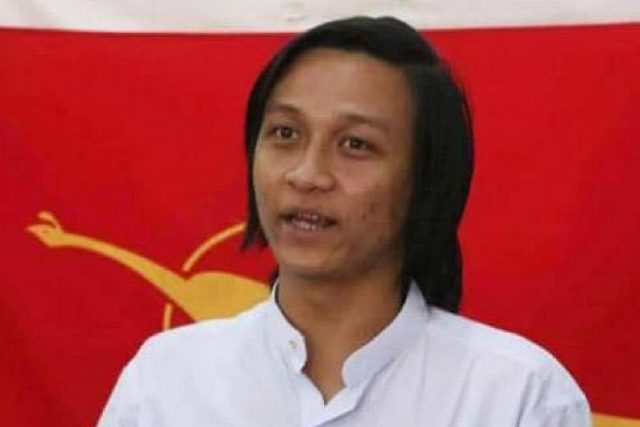
Former student leader Min Thway Thit was arrested before he could join nationwide protests against the February 1 coup (Yadanar Su Po Khaing/ Facebook)
More recently, the former associate secretary of the All Burma Federation of Student Unions (ABFSU) and founder of the Oway Library and Education Charity (Thanlyin) led a volunteer group established in Yangon’s Thanlyin Township to respond to the Covid-19 pandemic.
Min Thway Thit was detained for a full month before the regime released any information about him to his family. His wife, Yadanar Su Po Khaing, told VOA’s Burmese-language service in an interview that she wasn’t able to send him any medicine or other necessities until early March, when she first learned that he was being held in Insein Prison.
He now faces charges of violating vehicle-licensing regulations under Section 95 of the Vehicle Safety and Vehicle Management Act, which carries a maximum sentence of three years in prison. However, according to his wife, he has refused to take part in the proceedings against him because he has no confidence in the impartiality of the junta’s judiciary.
Ministers, monks and satirists
The most common crime committed by those arrested on February 1 was supporting the NLD, the party that won two successive landslide victories against the military’s proxy party, the USDP. Anyone tied to the NLD, either as a leading member or as an outspoken supporter, was fair game for a regime determined to silence the military’s most potent rival for power.
Surprisingly, perhaps, only a handful of NLD-appointed ministers have come under sustained pressure. Apart from State Counsellor Aung San Suu Kyi and President Win Myint, the only senior figures from the Union government still in custody are Soe Win, the ousted minister of planning and finance, his vice minister Set Aung, and his predecessor Kyaw Win.
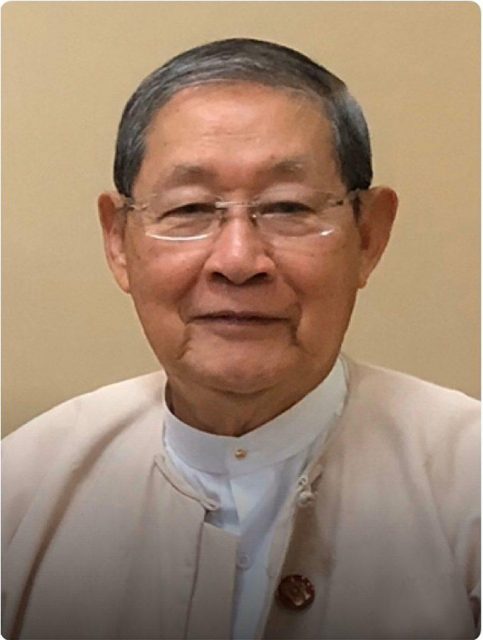
Soe Win, the ousted government’s planning and finance minister, is one of the few Union-level politicians still behind bars (Global New Light of Myanmar)
At the regional and municipal levels of government, however, a number of other senior officials have also been targeted by the junta. In early July, Mandalay’s chief minister, Dr. Zaw Myint Maung, and the region’s minister for electricity, energy and construction, Zarni Aung, were charged with corruption, more than five months after their arrest.
Similar charges, made in connection with alleged illegal deals involving Aung San Suu Kyi, have also been laid against Naypyitaw’s former mayor, Dr. Myo Aung, and deputy mayor, Ye Min Oo, as well as Min Thu, a member of the city’s development committee.
Of the monks who were arrested on February 1, Ven. Pyinya Thiha, better known as Shwe Nya Wah Sayadaw, was perhaps the most outspoken backer of the NLD. In 2011, long before the party came to power, he was banned from giving public sermons after he commemorated the 20th anniversary of Aung San Suu Kyi receiving the Nobel Peace Prize.
The abbot of Mandalay’s Myawaddy Mingyi monastery, Ven. Ariyawuntha Biwunsa (also known as Myawaddy Sayadaw), had also earned the military’s ire in the past. In late 2019, he was sued for defamation after he accused the armed forces of supporting ultranationalist monks. He was out on bail when he was arrested on the day of the coup.
In an interview with Myanmar Now following his release from Mandalay’s Obo Prison last month, he dismissed the junta’s claims that the NLD was bad for Myanmar’s Buddhist monks and repeated his charge that the military was trying to “exploit the people in the name of religion.”
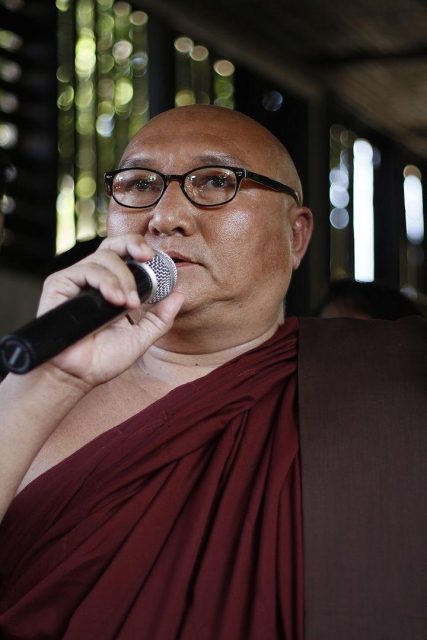
Shwe Nya Wah Sayadaw (Htoo Tay Zar/ Wikipedia)
Ven. Thawbita, one of the leaders of the 2007 Saffron Revolution, was taken away from his monastery in Patheingyi, east of Mandalay, in handcuffs on the morning of February 1. Two days later, he was sentenced to two years in prison after being found guilty under Section 66d of Myanmar’s draconian Telecommunications Law for an online comment he wrote more than two years earlier facetiously comparing Min Aung Hlaing to a cow.
As if to prove their utter humourlessness, the generals also went after a pair of prominent satirists on the day they seized power. One was Maung Thar Cho, who wrote satirical articles for the 7Day daily newspaper under the pseudonym of Jack (Kunchan Kone). These pieces proved immensely popular and earned him a following among NLD supporters, who invited him to literary talks around the country.
“They were kidnapped and now they are political hostages. The junta chief will use them to ease international pressure”
The other was Saw Phoe Khwar, an ethnic Kayin reggae musician who performed at NLD campaign events during last year’s election. Famous for his peace concerts, he is also well-known for his use of wit to skewer the military.
“The Son of Daw Sein Aye,” one of his most popular songs, plays on the name of the Defence Services Academy (DSA), the elite institution that produced most of Myanmar’s top military leaders. Ostensibly about an unruly man who makes trouble for his neighbours, it clearly refers to the DSA’s proudest alumni. Since the coup, it has become a popular protest song.
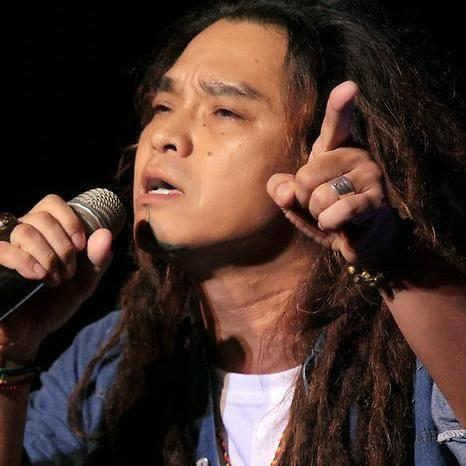
Since his arrest on February 1, Saw Phoe Khwar’s satirical takes on military behaviour have become popular protest songs (Saw Phoe Khwar/ Facebook)
Whatever reasons were given for their arrest, most of those detained on February 1 are likely to remain in the junta’s custody until it becomes politically expedient to release them.
Locked up for offending the generals, they are now just pawns in their game, according to former political prisoner Tun Kyi.
“They were kidnapped and now they are political hostages. The junta chief will use them to ease international pressure. They may be released, but they won’t be free, because they could be arrested again at any time. That’s just how it was done under previous regimes, too,” he explained.
Original Post: Myanmar Now
Announcements
21 May 2025
Open letter: Malaysia must lead ASEAN with principle, not hypocrisy, to address the Myanmar crisis

Progressive Voice is a participatory rights-based policy research and advocacy organization rooted in civil society, that maintains strong networks and relationships with grassroots organizations and community-based organizations throughout Myanmar. It acts as a bridge to the international community and international policymakers by amplifying voices from the ground, and advocating for a rights-based policy narrative.